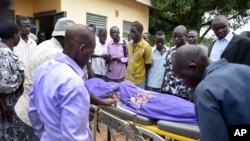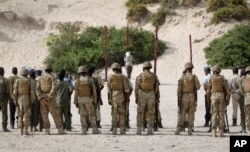The Committee to Project Journalists says 95 percent of the journalists murdered around the world over the last 10 years were local reporters. Yet, in its latest report, it says many of those responsible go unpunished.
The CPJ says such impunity is one of the biggest threats to freedom of the press. CPJ consultant Elisabeth Witchel, author of the new Global Impunity Index titled "Getting Away With Murder," said South Sudan ranks among the top five countries where journalists have been murdered with impunity in 2016.
"The situation is very dangerous, more dangerous than ever,” she said. “We're seeing journalists not just targeted for their work, not just from something they might be reporting on, but simply because they are journalists."
And the threats are not just coming from one side.
"It's not all government soldiers attacking journalists,” Witchel said. “We're seeing criminal groups that have become very powerful targeting journalists. We're seeing political groups like in South Sudan [where they] target journalists.”
South Sudan
The report noted that in January 2015, five journalists were shot, attacked with machetes, and set on fire in an ambush in Western Bahr el Ghazal state in South Sudan. The journalists were in a political lawmaker's convoy when they were attacked.
In September, a major South Sudanese newspaper was shut down by government operatives. In July, a local journalist was shot and killed in Juba when gunmen wearing government uniforms broke into the Terrain complex, which houses foreign and local journalists and aid workers.
Somalia
The worst country for the second straight year is Somalia, where the militant group al-Shabab is suspected of carrying out a majority of fatal attacks on journalists. Iraq and Syria rank second and third on the 2016 index.
Witchel said they were surprised last year to see Somalia surpass Iraq, where a record number of journalists were killed, "and 99 percent of them with complete impunity."
Between last year and this year, Witchel said there have been a few, slight improvements, which she calls encouraging, but added, "they are really very, very small."
Having no consequences for the perpetrators sends a menacing message to the media and the entire country, according to Witchel.
"You might start to see self-censorship, you see it become harder and harder for the media to cover important issues, and then that creates a huge information gap,” she said. “It makes it very difficult for countries like South Sudan that need to build a functioning civil society."
More of the murdered journalists covered politics and corruption in their home countries than any other beat.
In at least 40 percent of cases, the victims reported receiving threats before they were killed. According to CPJ, threats are seldom investigated by authorities and in only a handful of cases is adequate protection provided.






